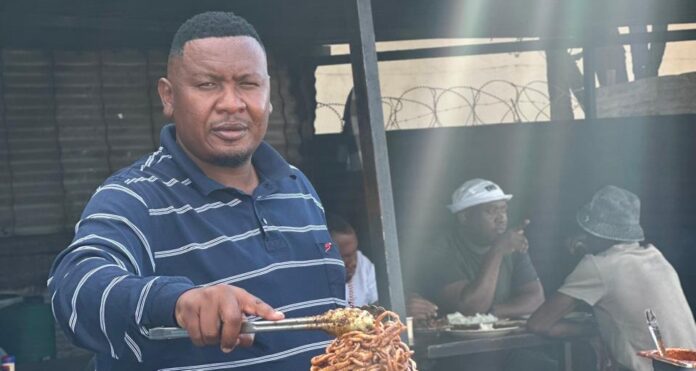Phuti Nathaniel Huma, an informal trader from Limpopo, left his job as a bank consultant to operate a successful business selling pap and roasted chicken intestines (malana) in Lebowakgomo, Limpopo.
Customers line up in long lines every day to get lunch or dinner because of Huma’s roasted malana, which is well-marinated with what he refers to as his own secret sauce and topped with either mild or spicy tongue twister chakalaka.
In a recent interview with Sunday World, Huma stated that he has now been able to purchase two vehicles through this business: a Suzuki S-Presso for a family and a Hyundai half-truck for the company, as well as two houses.
One of these houses is located in Motangtanyane village in Zebediela, while the other is being built at the recently created Lepelle-Nkumpi’s Zone R in Lebowakgomo.
The business, which has eight full-time employees, also contributes to the funding of another start-up that rents out tables and chairs for children’s events.
But it wasn’t always sunshine and roses.
Unfazed by his parents’ criticism
He left the comforts of a well-ventilated office block with a guaranteed salary in 2016 to launch a street food business that exposes him to odorous smoke and dust.
His parents and closest friends were very critical of the choice, discouraging him by pointing out that there are no guarantees in this line of work.
They warned that if the business failed, he might have trouble finding a professional job. However, Huma remained unfazed by the criticism because he believed that his business ideas were strong.
The 40-year-old proud father of two, who earned his Bachelor of Commerce in Human Resource Management from the University of Limpopo in 2012, is currently enjoying great success with his business endeavour, Phutnath Malaneng, nine years later.
According to Huma, his passion for food and cooking began when he was still a young boy, and as he grew older, he became interested in opening his own restaurant.
“My parents always liked the food I prepared and insisted that I prepare meals for the family most of the time,” he said.
“It was surprising to learn that they opposed my plans to open my own restaurant before I could enrol at the University of Limpopo to study.
“After my graduation I worked for Statistics South Africa in the Free State before coming home to Lebowakgomo when my contract expired at the end of 2012.
“And after two years of being unemployed, I got another job as a consultant at a commercial bank in a newly opened Zebediela Plaza in 2014.”
Competition from other vendors
Among the reasons for starting his own street food stand, according to Huma, were his frustrations with being turned down by employers during his job search.
According to him, he wanted to avoid the low income and depression that come with not being paid a living wage, which caused him to rely on his father, the only worker in the family of four, for extra money.
Huma stated that he founded his company while working for the bank.
While I was employed at the bank, I hired a few men to run the company. Unfortunately, when I was not there, the business did not do well, and when I was there, the opposite occurred.
“It only came to my realisation that the boys would set my stock aside and buy theirs to sell when I was not around and make their own money.”
At that point, Huma said: “I made the decision to fire them and take over the company to run it on my own, especially since I used to invest extra money in it by paying them salaries and replacing the damaged stock.”
More challenges emerged when more vendors began setting up shop next to him to sell comparable food.
“That did not only affect my business, but it also attracted the attention of the municipality, which started to threaten to remove us as we were defying the municipality bylaws.
“However, after a number of meetings with the officials, we were allowed to use the place on condition that we don’t litter the area and contravene traffic as well,” he said.
Customers happy with Huma’s food
He explained that most of his customers are staff members of the Lepelle-Nkumpi municipality, employees at Limpopo’s legislature offices, shoppers at the bustling Lebowakgomo CBD, and daily travellers who use the busiest Lebowakgomo intersection that links the roads to Jane Furse, Zebediela, Burgersfort, and Polokwane.
Huma said that he regards himself as a lucky person because his business is operating just opposite the shopping centre, which allows him to save money on fuel for stock purchases in Polokwane, which is almost 50km away.
“The shops here in Lebowakgomo have everything I need for my business, and that makes life easier for me.”
When asked about the food’s quality, a few of Huma’s patrons stated that they like purchasing the street-cooked food.
“Every time I come to Lebowakgomo, I make sure to get my meal here. The food is unique and always tastes so delicious that I miss them whenever I am home,” said Tebatso Tlometsane from Hwelesaneng village in Ga-Mphahlele.




